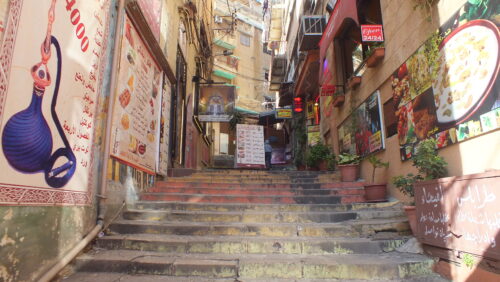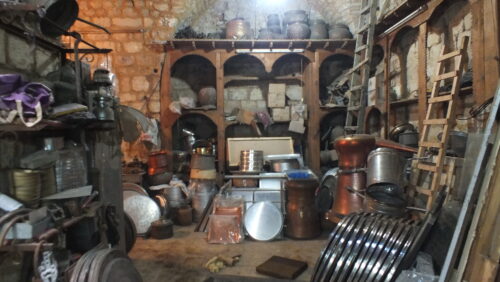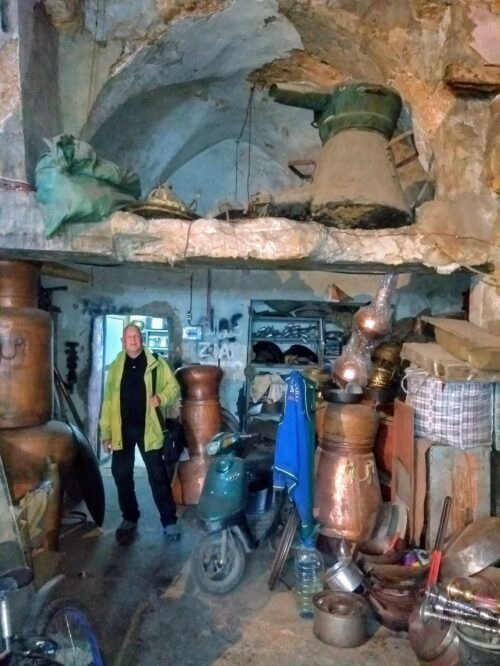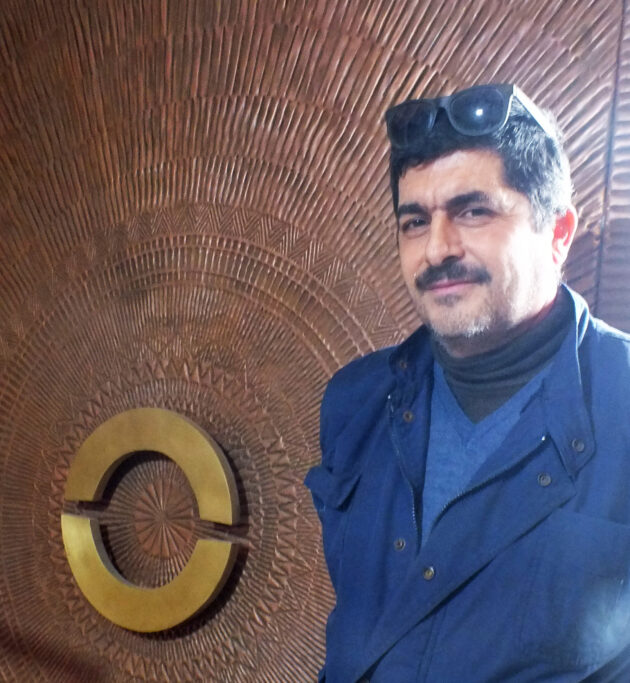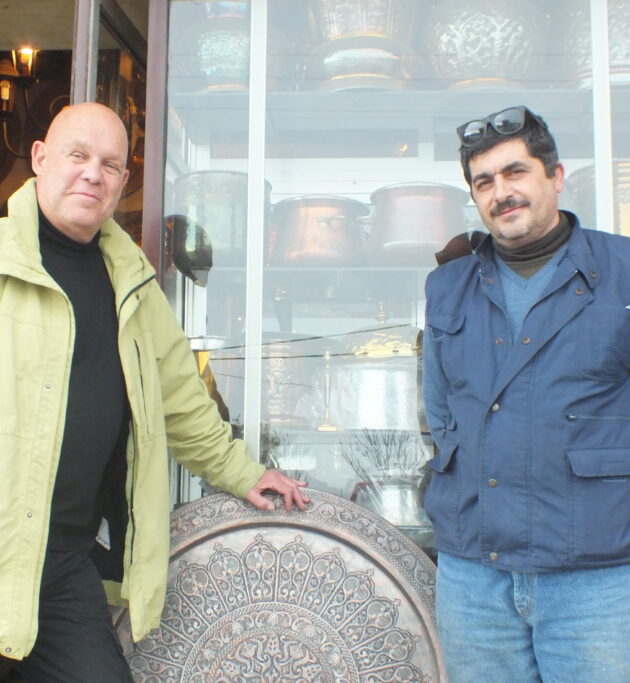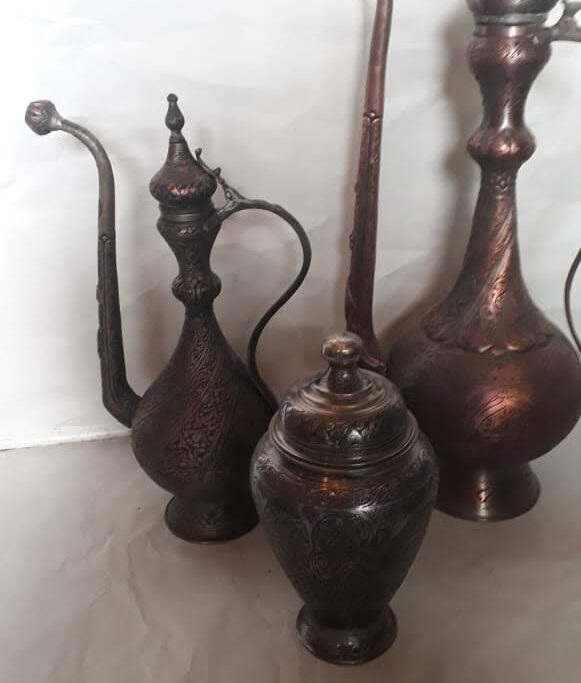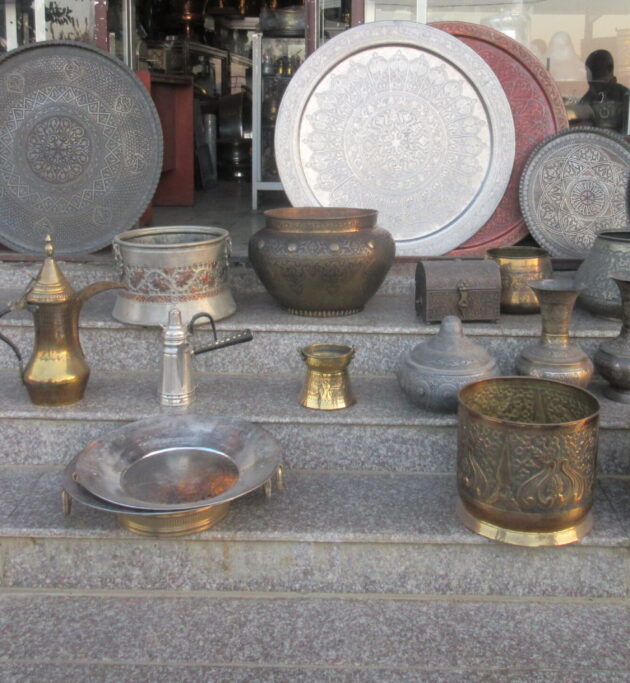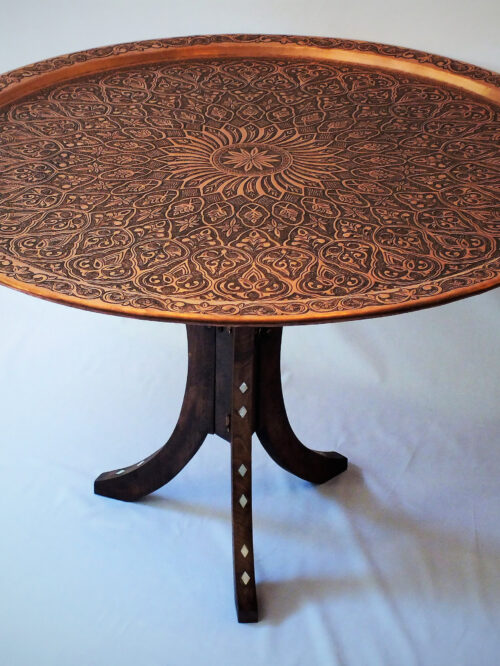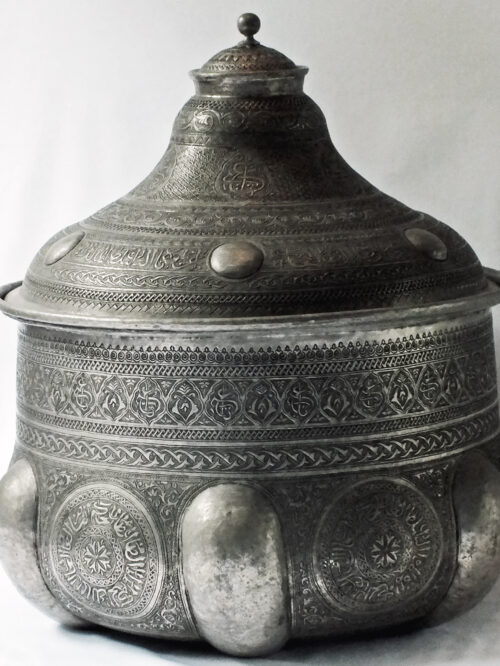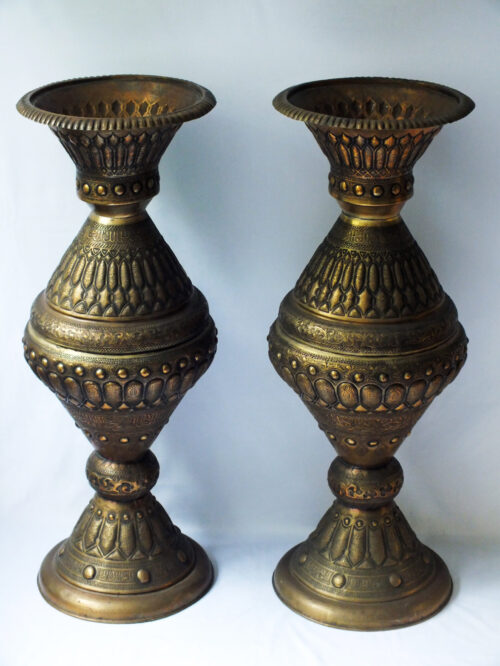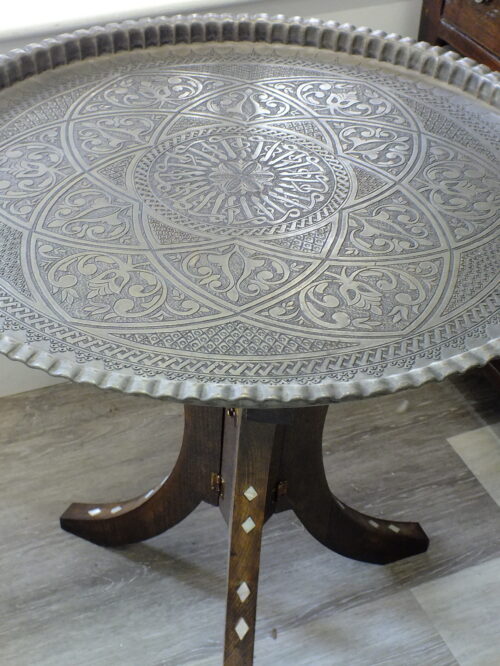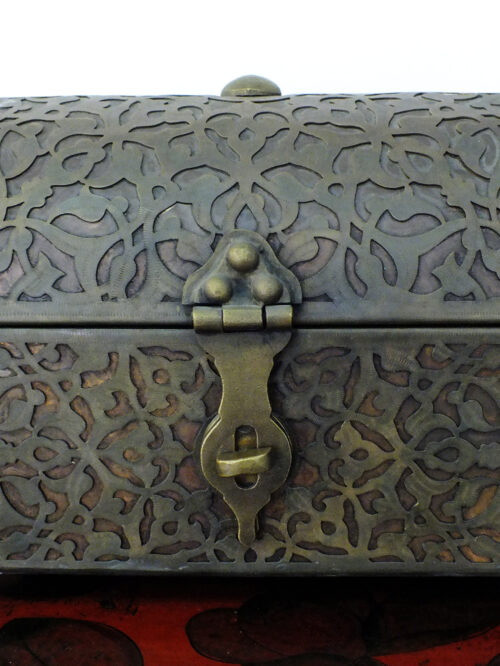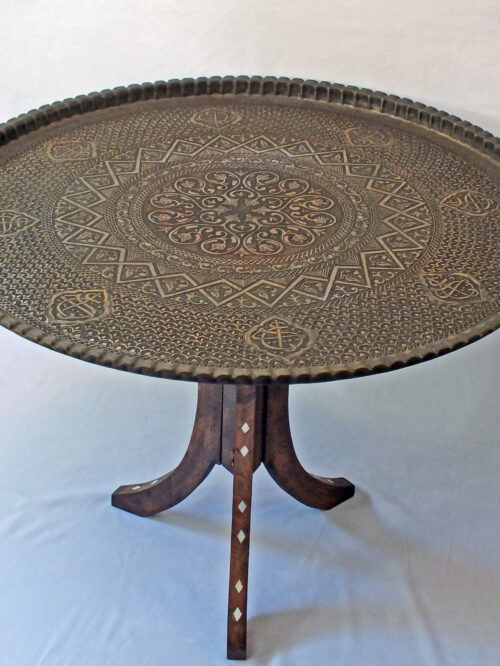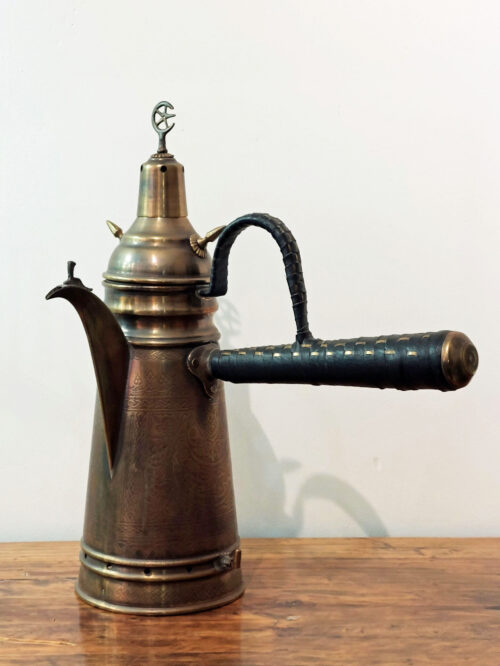Tripoli, second city of Lebanon, was the final and most northerly point on our itinerary and our last chance to find treasure to bring back for Drift. We knew from our research and planning, that Tripoli received few visitors despite its long history and strategic position as a port at the end of many trade routes.
We knew there was an ancient tradition of metalwork, particularly exquisite copperwork, dating back millenia and we had this confirmed by the friendly UNESCO office in Beirut.
However, that office, the internet and each book we referenced, couldn’t tell us where in the city we would find the artisans still working.
We had seen some ancient, antique and contemporary pieces in galleries and mansions in Beirut and across Lebanon but no-one could (or would) tell us from where they came.
So, we rented a room in El Mina, the old port area of the city, which was a real, friendly community, and set off to explore the city.
We quickly found the necessary facilities:
– a cafe serving the best breakfast we’d had in Lebanon – which pretty much means the best breakfast anywhere!
– obviously, a tiny bar down an alleyway just behind the port playing nice music and with a decent (Lebanese) red wine and Irish whiskey was essential.
– and, if it could be 200-300m from a hole-in-the-wall cafe serving fish that had just come off the fishing boats, well, that was ok too.
The basics covered, we started hunting.
The first area to check out was, of course, the souk. Or one of them. Tripoli has several souks, each specialising in several different “product categories”.
Rarely has that phrase been more loosely applied.
All the old-fashioned souks are still precisely as you would imagine 1001 Arabian nights – no tourist tack here. Jewellers, tailors, soap-makers, confectioners, and every other craft, trade and retailer you can imagine are jumbled together in the same way as they have for the last 5 centuries, often occupied by the descendants of the original artisans.
Narrow warrens of passages opening into fabulously atmospheric khans. A nightmare to find specific items but a wonderful way to spend a day, punctuated with Lebanese coffee and something sweet (how does anyone sleep in the Middle East?) The merchants know their immediate area but often oblivious to the rest of the city.
We covered most of the souks but the only copper we found were in very ramshackle hole-in-the-wall places that were mainly concerned with repairing cooking pots. The first couple of days, John drove in to the souks, located in the centre of the main city.
However, after losing the car twice; realising that even our miniscule Hyundai was too wide for some of the city centre lanes (very entertaining for the locals who sat, drank coffee, offered advice in three languages and, doubtless, laid bets on how stupid we really were) and frequently found ourselves, once extricated, circling back to the even greater amusement of the souk, we decided to walk into town or catch a bus or taxi – each much more interesting.
We did, however, chance upon a water jug, tray table and coffee pot that seemed to have some age. But it wasn’t getting us closer to any of the copper craftspeople whose creations we’d seen elsewhere.
Then again, maybe fate was with us. As we have followed the principle, from the first day of Drift, of only sourcing our treasures directly from the makers of each item (antiques excepted, of course), we frequently end up well off the beaten path or tourist trail.
But this often means we are beholden to luck – helped by spending extra time, walking and talking.
Thus, at the end of an unfruitful week, we took a taxi into town to give the souk merchants’ sides a rest. En route we passed a small shop which was selling, amongst other interesting items, some gorgeous copperware.
Terminating the taxi ride in this unknown area of Tripoli, we enquired of the shop-assistant (who looked rather surprised to have a large bald Englishman and a Russian woman in her shop) the origin of some pieces. We each had two languages… but none in common.
A phone call later and a middle-aged gentleman appeared and we quizzed him about several of the pieces. He responded that the copperware was made by his sons and he could take us to their workshops just a 30 minute drive outside Tripoli.
Now, we have been sourcing around the world for Drift since 2005 and ,prior to that, both of us have lived and worked in various continents so we have frequently heard “my uncle/cousin/brother has a shop, you must come see”. Nowadays, when it is discovered that we’re “shopping for business” a veritable horde of relatives seem to have opened shops.
However, we got into the back of this stranger’s car, on the outskirts of Tripoli, in Lebanon, and were driven 30 miles down the coast to a little village called Qalamoun (no, we hadn’t either) where his three sons carried on their craft. A fourth son was based in Beirut as a contact and “rep” for their discerning customers there.
We had found the Hassoun family, of whom we had heard tell, and who had been master coppersmiths between Damascus and Tripoli for more than 8 generations.
At last…. but too late! We had flights, departing 2 days after this discovery, to Istanbul and an appointment with our fab goldsmith there.
The flights and visa could have, with cost and difficulty, be amended. The appointment, not.
So, we took photos and details and wondered if we could sensibly arrange shipping remotely via the nightmare that is Lebanese bureaucracy and headed back to Beirut, said hi to Abraham again and flew out.
Our plan had been to turn East at Istanbul and head towards Kazakhstan for another adventure.
However, on our second night in Istanbul; in Kadikoy on the Asian side of the Bosphorus; over a beer and some fried hamsi; we simultaneously said
Why don’t we go back to Tripoli and sort out a shipment?
So we did.
A flight into Beirut a week later, we hired a car in the airport and drove up the coast to Tripoli.
Another couple of weeks spent commissioning pieces, arranging the appropriate export licences and shipping documents (as well as consuming Lebanese food and wine in quantity – no Lebanese restaurant on this island).
We also learnt that the our souk finds were really good pieces. All nice quality Ottoman items, each over 80 years old. We asked Radwan and his craftsmen to clean and, where necessary, make some minor restoration. Who better?
Addendum: we’ve kept in touch with Radwan and family, the breakfast boys and several others in that wonderful and maligned country.
Abraham, in Beirut, had a lovely apartment that we stayed in twice, in the Achrafieh area, too close to the explosion to avoid damage. Happily, he’s fine and continues to party.
But then, he’s Lebanese
We’ll be back



